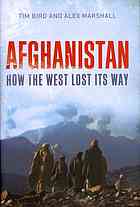
Afghanistan
How the West Lost Its Way
- اطلاعات
- نقد و بررسی
- دیدگاه کاربران
نقد و بررسی

April 25, 2011
Feckless nation building snatched defeat from the jaws of a resounding military victory, argues this mordant retrospective of the 10-year conflict in Afghanistan. War historians Bird (King's College, London) and Marshall (University of Glasgow) focus on a lack of strategy: from the start of the invasion in 2001, the American government and its NATO allies had no clear idea of their goals in Afghanistan beyond skimping on soldiers and money. The result, the authors note, is a chronically undermanned occupation force unable to secure the countryside and overreliant on airstrikes that regularly kill civilians; trifling aid packages that leave Afghanistan's basic needs unmet; a lazy policy of backing both a corrupt central government and despotic rural warlords; an unpopular counternarcotics program that has failed to stem the booming heroin economy; and a resurgent Taliban due to inept Western counterinsurgency initiatives not improved by Obama's appointment of General McChrystal. None of these criticisms are new, but the authors integrate them into a telling panorama of clueless policy making. (In one vignette, British development experts reach out to baffled desert tribesmen with a nature documentary on whales.) Although they don't quite pinpoint the right strategy for Afghanistan, the authors present a lucid, devastating critique of the road taken. Photos.

May 15, 2011
Books explaining America's botched war in Afghanistan are catching up with those doing the same for Iraq; this lucid account by two British military historians will keep readers gnashing their teeth throughout.
Bird (Defense Studies/King's College, London) and Marshall (History and War Studies/Univ. of Glasgow) stress that righteous anger drove the American invasion in October 2001, and the U.S. military followed a clear strategy—remove the Taliban, destroy al-Qaeda and eliminate Afghanistan as a base for international terrorism. After an apparently easy victory, clarity vanished. By early 2002, troops were departing for Iraq, leaving free Afghans to build a modern society which was assumed to mean a strong central government and free elections. This was disastrously naive because traditional Afghan tribal networks treat government as a winner-take-all arena in which those in power enrich themselves and their tribe to the exclusion of others. Preoccupied in Iraq, five years passed before the U.S. administration noticed that a revived Taliban was thrashing the incompetent Afghan army, predatory police and kleptocratic local warlords. A corrupt, ineffectual central government relied on foreign assistance and the flourishing drug trade, which now supplies nearly 90 percent of the world's heroin; taxes provide less than 10 percent of Afghanistan's budget. Always conscious that its major ally, Pakistan, supported the Taliban, the American government grew uncomfortably aware that billions in aid had not bought its loyalty. Despite revived efforts, the authors conclude that competent central government and victory over the insurgents remains unattainable. Despite the Obama administration's optimistic rhetoric, it is likely that most of its energy is aimed at a politically acceptable exit strategy.
A gloomily convincing portrait of American misadventures in Afghanistan.
(COPYRIGHT (2011) KIRKUS REVIEWS/NIELSEN BUSINESS MEDIA, INC. ALL RIGHTS RESERVED.)




دیدگاه کاربران